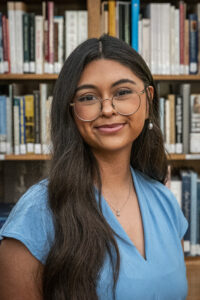This post is part of our blog series “Scholars Speak,” which features writing from our 2024 cohort of Preservation Scholars. Click the link to learn more about this donor-funded program that aims to increase the diversity of voices in the Texas historical narrative by placing students from underrepresented cultural and ethnic backgrounds in paid, 10-week long summer internship positions at the Texas Historical Commission.
Scholars Speak: Uncovering Hidden Histories

During my internship at the Texas Historical Commission as a Preservation Scholar, I worked in the Community Heritage Development Division to promote heritage tourism around the Undertold Historical Markers program. Through this work, I gained a deeper understanding of how history can affect public service and how accurate and complete historical narratives are vital to preserving the past. Before this internship, I viewed public history as solely preserving facts and events; however, now I see that it is about preserving community identity and collective memory. The process of engaging communities, uncovering hidden narratives, and creating a sense of belonging in a community’s history are crucial in the preservation of history.
Researching undertold court cases in Texas, such as Dan Moody and the Ku Klux Klan (KKK) trials and Jessie McGuire Dent’s fight for equal pay for African American educators, has highlighted for me the importance of recognizing and rectifying historical injustices and silences. This work has also underscored the importance of inclusivity in historical narratives, ensuring that the contributions and experiences of marginalized groups are accurately represented.
As I was able to reflect on my personal history as a Mexican American, who was born in Austin, Texas, I am reminded of the history and contributions of my community. The opportunities presented through the Preservation Scholars Program have allowed me to network and meet with different communities all around Texas. This perspective has deepened my commitment to highlight Texas’s rich heritage and the diverse stories of Texans.
Looking forward, this internship has inspired me to continue advocating for inclusive and equitable representations and narratives of history. I am motivated to pursue a career that combines my passion for advocacy and my newfound interest in and understanding of heritage tourism. Ensuring that all communities and cultures have the chance to reflect on and honor their heritage and public history has now become my priority.